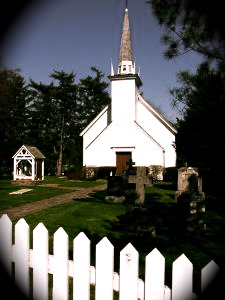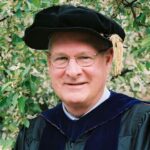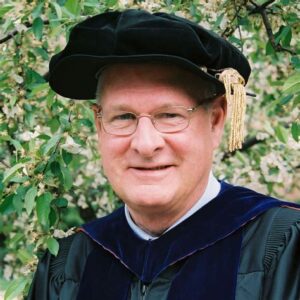
Hillsdale, MI. Most of us learn about friendship from our families, just as we learn about everything else worth knowing from our families. Mine is an old New England family, farmers and preachers and doctors and lawyers, and tradesmen, not many in commerce. Nobody up to my generation was ever rich, nobody particularly poor, so there was comparatively little arrogance and comparatively little envy.
New Englanders were historically family-loyal, but not clan-loyal. Harriet Beecher Stowe thought that of all the English ideas her ancestors brought with them, that not even democracy was able to “obliterate, was that of family. Family feeling, family pride, family hope and fear and desire” were what made New England. My Grandmothers Willson and Fuller, two ladies who could not be more unlike each other, both said, often–no debate–”family first.”
Traditional New Englanders were “town-born” and thus attentive to their neighborhoods and local associations, and more often than not rather interested in the affairs of the comity. This made them good neighbors but not always good friends. They might have to stand up in the Congregation and accuse the person next door of some breach of individual or community morality, which called for a certain reserve. As the half-savage neighbor in Robert Frost’s “Mending Wall” says, “Good fences make good neighbors.”
Frost also wrote (in “A Considerable Speck”),
I have none of the tenderer-than-thou
Collectivist regimenting love
With which the modern world is being swept.
Until well into the 20th century even Massachusetts (certainly the rest of New England) would have been a red state, and a large part of that would have been due to the need to be neither “too far out nor too far in.” Frost wrote in “Build Soil,” “Don’t join too many gangs.”
The story of Jonathan and David was never very popular in traditional New England, even as attached to the Bible as those hardy folks were. They preferred the dutiful reserve they found in Joseph (that is Mary’s Joseph); there has been a Joseph in my family every generation since 1634. Mrs. Stowe often said that the underlying foundation of New England life was a “profound, unutterable, and therefore unuttered, melancholy, which regarded human existence itself as a ghastly risk,” which is not an attitude conducive to forming loving friendships outside the family, nor to being sentimental about larger collectives.
My father (the last of the old time country doctors) and mother were loving and open and without guile, but had few friends. Willsons are a friendly bunch, but neither I, nor my brothers, nor my sister have had many friends. This Yankee trait still gets transmitted long after the culture (and the cult) that nurtured it has withered. Sometimes I admire the rituals of friendship that certain Southerners cultivate (they, after all, invented fraternities); more often, not. Grandma(s) said, “family first.”






7 comments
Marion Miner
Hahahaha… “the haunting fear that someone, somewhere, may be happy.” Love it.
John Willson
West, Yes, David Hackett Fischer’s book is one of the great works of history written in the 20th century. I had him here at Hillsdale a few years ago, and he gave an incredible talk on the same ethnic theme about the Africans who came here usually without wanting to. Why do you suppose it hasn’t yet been published?
Sabin, It is Mencken. The old bastard said that “Puritanism is the haunting fear that someone, somewhere, may be happy.” I think Mencken was a whole lot less happy than my Puritan ancestors. One of them said, in 1770, in the FIRST declaration of independence, “Ye are, as yet, free men.”
Levy, Yes, God bless them and us in Hillsdale, we are town born! Another book of David Hackett Fischer’s that every American should read is “Paul Revere’s Ride.”
Bob Cheeks
DW, You Eastern Elites have to learn that you lost the western privileges when the great state of Virginia (Lee’s “country”) ceded their claims.
Re: “mind their own business” was directly related to the New Englander’s desire to dominate national politics and all the trouble that caused. We’d been better to let them go during the Hartford Convention (a fine idea indeed!).
But Father Willson provides a delightful exegesis in his analysis of friend and family, a perspective I’ve seen you take on any number of instances.
Neighbor kid’s here with the snow plow and I’m getting the car out; another three inches coming today…how you doing in the fancy suburbs?
That Algore and his ‘global warming’ what as card!
D.W. Sabin
Cheeks, “mind their own business”. What? I have frequently learned something about the latest actions of a member of my family before I get home at night. From the Post Office to the market, we have many places to catch up on family news and if one wants something put out on the tips of everyone’s tongues, we know exactly who to go to.
Then their is Mencken’s tart quip (or is it Dorothy Parker?) that the reason behind Puritan New England’s dyspepsia is that they are always on alert to punish anybody who has the temerity to have a good time.
Then there are the Irish, thank Gawd fer the Irish…the Blacker, the funnier, the better.
I’m from Utah long ago but when I moved to Vermont and later Connecticut, for some strange reason, I felt entirely at home. This , of course, is always because of friends.
And by the way Cheeks, you folks out there in the Western Reserve stole our best farmland and we want it back dammit.
barry levy
Insightful comment, but it does not take into account New Englanders’ devotion to town government and economics which took them beyond the household or to the dispersal of children in New England from household of birth to other households for their labor, something very common and commented on by Harriet Beecher Stowe in Old town Folk. I would say it was town beyond family and that their was not a lack of local friendliness but a suspicion, quite rightly, of broad, meaningless loyalties to abstract or far off groups, when the local group was so in need.
I say this not from genealogy. My family does not arrive until the late nineteenth century on these shores, but from scholarship and surprise at the local culture(see Town Born: the Political Economy of New England from its Founding to the Revolution. UPenn Press. ). Because they chose to settle in towns and have them as centerpieces of economic development and developed protected town labor groups, New Englanders carried on more than most the local xenophobia of England.
N. P. West
Thank you for this very insightful post. As a New Englander whose family goes back to the Great Migration I can say that your assessment of the importance of family is spot on. My particular kin migrated from pre-Revolutionary Rhode Island to Vermont to upstate New York and back to Vermont. And most notable about this is that when they moved virtually all of their adult children moved with them. And when some of us moved out to Minnesota and points West (as many New Englanders were apt to do) once again they went as a family.
I wonder if you have read David Hackett Fischer’s monumental “Albion’s Seed” Four British Folkways in America”. It is a massive volume that looks at four distinct British cultures who settled in America: the New England Puritans, the Delaware Valley Quakers, the Chesapeake Cavaliers, and the Scots-Irish of Appalachia. The book gets into all sorts of detailed analysis of each group including: architectural ways, family ways, marriage, gender and sex ways, child naming and nurturing ways, old age and death ways, religion ways, education ways, food ways, etc. It has to be probably the most in-depth look at Anglo-American culture in print. I highly recommend it!
Bob Cheeks
I really liked this one Willson.
One point for further consideration re: your analysis of “Southern” culture as it concerns friendship. That phenomenon may be related to the past “unpleasantness” and the corporate suffering endured by Southerners.
Weaver has some comments on that matter. I see “their” families as closely bonded, if not more so, than Yankee families, though I agree with your analysis of the folks from “the shining city on the hill.”
You remind me to get out my Robert Frost and to be grateful for that insightful Yankee.
The good ones stayed home and minded their own business. But, that’s true under any circumstances.
Comments are closed.